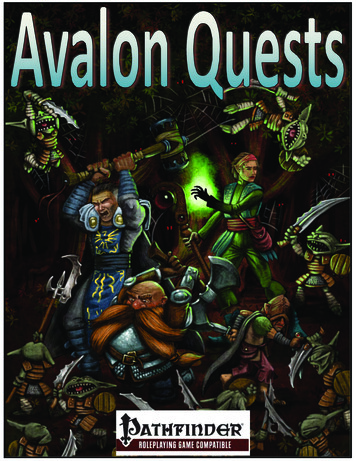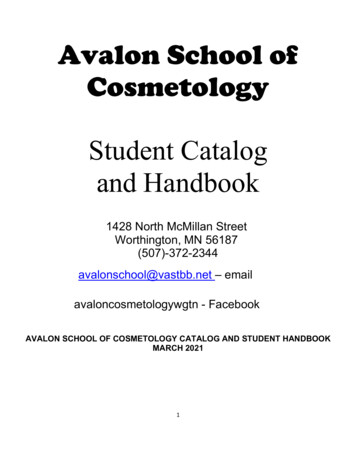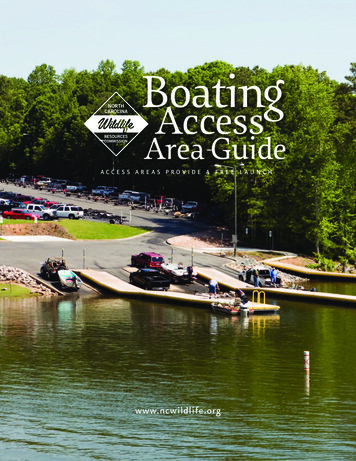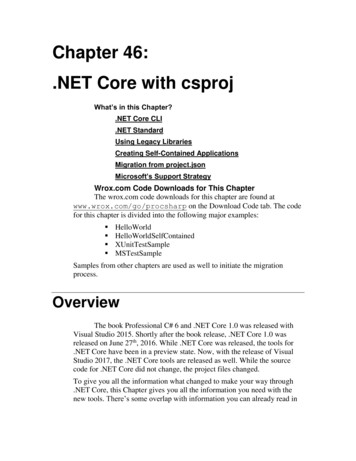
Transcription
!
Avalon QuestsThe Solo Party Adventure Generator System:A Pathfinder game system for a party of adventurers controlled by a single Player.* For anyone who has ever wanted to play a solo Pathfinder adventure * For anyone who has ever wanted to learn the rules of the Pathfinder Roleplaying Game by playing a fully-realizedsolo version of the game * For anyone that has wanted to play a solo Pathfinder adventure that takes their characters from acquiring their firstadventure at an inn all the way up to defeating their evil nemesis * For anyone who has ever wanted to play a fully cooperative game without a Gamemaster sitting on the oppositeside * And for anyone who just has an hour or two and wants to play a game of Pathfinder Now there is Avalon Quests, SPAGS!It's all here: the inns, the monsters, the treasures, the secrets, and the story!The Solo Party Adventure Generator System used by Avalon Quests will generate a fully realized campaign world,complete with towns, wilderness travel, set dungeons, randomized combat, special encounters, and a story - everythingyou need for a full campaign of Pathfinder.Every aspect of the Pathfinder Game System will be used during the course of the adventures of SPAGS, includingcombat of course, but also including skill use, character interaction, and the buying and selling of equipment within alimited kingdom economy.While "solo" is in the title of this system, that in no way means that this is an adventure for a single character. Rather, itis a system designed for a solo Player. That Player will be taking command of an entire adventuring party, and will beguiding them all through the campaign.With Avalon Quests, the SPAGS rules will simulate the place of the Gamemaster, with randomized tables governing thegameplay, providing surprise, and adding variety to the adventure. Since much of the content is randomly generated, aPlayer can even play the same adventure more than once, and the adventure will play out very differently. However,Avalon Games [TM] will be providing many SPAGS adventures in order to provide as many different solo experiencesto you, the Player, as possible.In order to play the Solo Party Adventure Generator System (SPAGS), you will need the Avalon Quests, SPAGS BaseRulebook and one of the Avalon Quests adventure books. You will also need the Pathfinder Core Rulebook.SPAGS can't really have is a Gamemaster, since the system is specifically designed to randomly generate the adventure.It can, however, benefit from a Referee during group play (though it does not need one). And if someone in the groupwants to perform that aspect of the Gamemaster's role, a referee can add a layer of additional challenge to the game,since a referee helps to maintain the core integrity of a group game.1
An Avalon Games Product, All rights reserved, Version 1.0, 2013All comments, suggestions and contacts can be made at Avalon Games Company, avalon@comstar-games.comOr visitAvalon Games at www.avalon-games.comWrittenbyAJ KenningCoverbyWayne PetersTrade DressbyPublisher’s Choice Quality Stick Art, Copy Right Rick Hershey / Fat Goblin Games, Jerry Keyes, 2011.Licensed by Above Average Creations. Used by permission.”Product design, artwork and layoutbyRobert HemmingerSome Artwork by Forge Studios and Rick Hershey, Empty Room StudiosCompatibility with the Pathfinder Roleplaying Game requires the Pathfinder Roleplaying Game from PaizoPublishing, LLC. See http://paizo.com/pathfinderRPG for more information on the Pathfinder RoleplayingGame. Paizo Publishing, LLC does not guarantee compatibility, and does not endorse this product.Pathfinder is a registered trademark of Paizo Publishing, LLC, and the Pathfinder Roleplaying Game and thePathfinder Roleplaying Game Compatibility Logo are trademarks of Paizo Publishing, LLC, and are used underthe Pathfinder Roleplaying Game Compatibility License. See http://paizo.com/pathfinderRPG/compatibility formore information on the compatibility license.Pathfinder and associated marks and logos are trademarks of Paizo Publishing, LLC, and are used under license.2
PreparationThe Solo Party Adventure Generator System begins withthe Player making up to 6 characters using thePathfinder Roleplaying Game rules. The Player canmake use of any official book of the Pathfinder systemwhile doing so, but it is recommended that the Playeravoid the use of all unofficial rulebooks, as the rulesfrom such books can upset the difficulty of a SPAGSadventure.These possible six characters that the Player makesshould be of a suitable level for the selected SPAGSadventure. The Player can take a lesser or greaternumber of characters along on the adventure, shouldsaid Player want, using the Pathfinder rules to adjust thelevel of the characters accordingly, so that they remainof an equivalent Challenge Rating for the adventure. It isnot recommended that a Player adjust the level of thecharacters by more than 2 either way, as any more cangreatly upset the balance of the Pathfinder game.Before making characters, though, the Player will beginplay by reading Chapter I of the selected adventure,which will introduce the Player to the setting of theadventure and will likely also begin that adventure'sstory (though some adventures may hold off until laterto begin their story). The Player will return to the TravelBook for that setting as soon as the party steps outsidethe adventure's starting area and enters the wilderness,thus beginning the adventurous part of the adventure.While a game of SPAGS is governed by two books, theBase Rulebook and the selected adventure, which oftencomes in two parts, the travel book and the quest books.SPAGS is organized in such a way as to greatlyminimize the amount of switching that must be donebetween the these books. The Base Rulebook governsthe overall rules needs to play while the Travel Bookgoverns the movement needed in the adventure (thingssuch as wilderness travel), while an Adventure Bookdetails the encounters that might be met during theadventure.3Essentially, when playing a game of SPAGS, theadventure book governs all of the events having to dowith the adventure's story, any puzzles that may beinvolved, and the determination of the type and numbersof any antagonists that are met. Thus, despite this beinga randomly generated system, when a Player picks up anadventure for SPAGS, the adventure will automaticallygenerate different events, encounters, and story from anyother SPAGS adventure.OrganizationIn order to better keep track of the various events, tables,and encounters across two separate books, the adventurebooks of SPAGS will use Roman numerals for tablenumbers, section numbers, etc, while the Base Rulebookwill use the Hindu-Arabic numerals. That way, when onebook refers to events or descriptions in another, it ismuch more clearly defined which book is being referredto.Similarly, the first number in a Table's title will alwaysreference the section that the table can be found in.Which means that all tables in section nine will startwith the number "9" in their title. Thus, when referringto Table IX.V.I, it should be readily apparent that thetable in question is in the adventure book, and that it is inchapter nine of that book.AttributesWhen making characters for a SPAGS adventure, it isbest to use the Pathfinder Standard Fantasy rules. APlayer can use any setting that Player likes, but theadventures of SPAGS are made with the StandardFantasy setting in mind. If a Player raises or lowers thesetting but still wants the intended challenge level of theadventure, that Player will need to adjust the difficulty ofevery single encounter accordingly.
EquipmentMost likely, the standard equipage rules for thePathfinder Roleplaying Game apply to the chosenSPAGS adventure. However, some SPAGS settings mayrestrict equipment for various reasons. As such, it is bestto consult the chosen adventure's Preparation section(refer to Chapter II: Preparation in the selectedadventure book) before purchasing any equipment forthe characters.For existing characters brought into a SPAGS adventure,there a few rules about equipment. 1) No artifacts. 2) Nosingle piece of equipment that exceeds the regularStarting Wealth for a character of that level all by itself.3) No specialty equipment that was designed for anadventure outside of the SPAGS system or that wasgiven as a special reward from one of those outsideadventures.All such equipment, and any benefit they have ever hadupon the character, must be removed from the characterbefore beginning play in a SPAGS adventure.These restrictions are there to ensure that the intendedchallenge level for the adventure remains intact. APlayer can ignore these rules if the Player wants, butshould do so knowing that it may lessen their enjoymentof the game.The PartyA SPAGS adventure is intended for 6 characters. It ishighly recommended that this be a diverse party insteadof a highly specialized one. SPAGS has been designed tocall on every aspect of the Pathfinder game system, andwhile a highly specialized group can do a great deal ofdamage, such a group may find a lot of difficultysucceeding if they lack the requisite abilities that arebeing called on in other aspects of the adventure outsideof their highly specialized abilities.4Of course, the Pathfinder game system is designedaround the idea of having a party of four adventurers,and SPAGS is having you make 6. However, you do notneed to do anything about the related difference inChallenge Rating of the encounters, as you wouldnormally have to do, as the adventurers of SPAGS havebeen designed with that difference in Challenge Ratingalready taken into account.Now, a particular adventure of SPAGS may adjust thenumber of characters in the party, so again it is best toconsult the Preparation section of the adventure beforemaking a party, where such information will always bedetailed.SPAGS uses a number of terms that may be new toplayers of the Pathfinder Roleplaying Game. Theseterms will all be defined for you here. If you are alreadyaware of these terms, there is no reason to peruse thissection.Alarm Level: In a SPAGS adventure, some territorieswill be controlled by an organized force. Such forces arecapable of raising an Alarm. Effectively, this is awarning system that causes everyone in the territory tobecome more alert to invasions into their territory.Alarms can be (but will not always be) caused by theactions of the party. The more actions the party takesagainst the forces of an organized territory, naturally themore alarmed they will become. Alarm Level is a ratingof 1 to 3, and adds into several of the Encounter rolls.Danger Level: The hex map for every adventure ofSPAGS is divided up into territories. A territory is,effectively, an area of terrain that is controlled by agroup of people. In other words, a kingdom is a territory,as is the tribal lands of the orcs. Even a no-man's land isa territory, though in such a case it is controlled by thebeasts of the wild.
Every such territory will have a Danger Level associatedwith it (though it might be zero). The Danger Level isjust as it is described - an illustration of the amount ofthreat that an area holds for an adventuring party whoenters it. Danger Level is a number, 0 through 10, and isdepicted by an equal number of skull-and-crossbonesfound next to the name of the territory. If there are nosuch skull-and-crossbones, then the Danger Level of thatarea is 0, which does not mean that there is no threat atall in that territory, merely that the threat of monsters isminimal at best.Encounter: In the adventures of SPAGS, the term"Encounter" refers solely to Events that involve anotherentity that could potentially be fought in combat. Thatother entity may be a simple peddler allied to theadventurers that the Player has no intention of havingthe party attack, but it is still considered an Encounter,because combat could potentially occur between them,however unlikely it may be.You will find that the Encounters section of SPAGS aremuch more detailed than the other Events. This isbecause the range of possibilities from such Events tendsto be far more wide-ranging than the other kinds, and thenumber of Tables governing those possibilities increasesaccordingly.Event: Many times, the term "Encounter" is used forany occurrence during a gaming session. SPAGS, withits many randomization tables and multiple books, needsto be more precise in its definitions of these occurrences.As that is the case, the term "Event" is used to indicateany kind of occurrence during a SPAGS adventure,while "Encounter" refers only to those Events whichmay involve combat.Glory: Glory is a measure of the number of great deedsthat the party has accomplished. It is, in many ways, amirror of Notoriety, which is a measure of the number ofcrimes the party has committed. Amassed Glory will5influence how certain Encounters play out. Morespecifically, the more glorious deeds the party haveaccomplished, the greater the chance the party will berecognized by those it meets. And that can be a bit ofproblem when the party meets forces of the enemy it hasbeen committing those great deeds against.Since Glory is a measure of the number of great deedsthat the adventurers have done, and those great deedstend to be deeds against the forces of the enemy, theenemy forces tend to take more and more notice of theparty the larger the number of great deeds they havedone. Thus, the greater the Glory, the more guards theenemy will place over the entrance to their base, themore patrols they will run, and the more alert they willbe to incursions into their territory. Additionally, themore Glory the party have accumulated, the greater thechance that those enemy forces will immediately attackwhen spotting the party.Conversely, though, Glory tends to also be a measure ofthe amount of respect that the party receives back home.The more Glory that the party has accumulated, the morethey will be honored, and thus the more important themissions they will be entrusted with are likely to be.Glory starts at zero.Notoriety: A measure of the amount of criminalmischief that the party of adventurers have gotten up to.Notoriety starts at zero. Certain actions, when taken, willraise the party's Notoriety. While the level of the party'sNotoriety has no affect upon the percentage chance ofhaving an Event occur, it can change the nature of thoseEvents, particularly when said Event is a meeting withan agent of the civil authorities (such as a policeman).Period: For the purposes of the game, travel has beenorganized into 4-hour Periods. A single period is thelength of time it takes to cross a single hex of difficultterrain on a SPAGS adventure map. This setup allows forthe easy management of time and travel while playingthe adventures of SPAGS. For more details on travel, seethe Travel section below.
Travel BookThe Travel Book covers the details of the journeyinganywhere outside of one of an adventure's settlements ordungeons and is geared towards a particular setting.Different settings will thus have different Travel Books.Quest BookThe Quest Book is a set adventure or collection ofadventures that the player group can explore. This bookgenerally offers all the information on quests,settlements and the details of adventures the group mayencounter.Hex MapEvery SPAGS adventure comes with a hex-basedwilderness map, hereafter termed the World Map. TheWorld Map is not a map of the entire world, by anymeans. It is, instead, an overland map of a part of theworld - as opposed to a more specific map, such as adungeon or village map. The World Map is thecenterpiece of a SPAGS adventure. All of the adventure'sEvents, locations, and enemies are located somewhereon this map. Some of those locations may be hiddenwhen the Player first begins the adventure, may even bein a random location on the map, but they are all there,somewhere.Unless the adventure specifically states otherwise duringan Event, whenever attempting to travel anywhereduring the adventure, the Player breaks out the selectedadventure's World Map and moves from hex to hex.Hex NumbersThe hexes of every SPAGS hex map are numbered. Thenumbers are located at the top of the hex. If you look atthe map, you will see that the numbers look somethinglike this: 15, 9. These are two separate numbers, andthey translate to the X and Y coordinates on the hex grid.To state that a different way, the first number (the 15 inthe above case) is the column number, the secondnumber (the 9 in the above case) is the row number. Sohex 15, 9 is the hex at the intersection of column 15 androw 9. If a SPAGS quest lists hex coordinates and asksyou to find that hex, that is how you do it.6Many of the adventures of SPAGS include randomlygenerated adventure locations. When determining theselocations, you will be asked to make two separate dicerolls. The first roll will determine the quest location'scolumn, and the second roll will determine the row. Youwill then place a quest marker on the resulting hex.Travel DistanceThere are highly detailed travel rules available forPathfinder, but SPAGS doesn't use those. SPAGS uses itsown limited travel system, designed to get the party totheir destination with a minimum of fuss. The hexes ofSPAGS are large, allowing a great deal of detail to becrammed into one hex, but also allowing for a certaintype of travel system.For SPAGS, the game day is broken down into 6four-hour periods. The length of time it takes anycharacter to cross one hex of difficult terrain is equal toone such period. During that same period, a charactercan cross two hexes of regular terrain (such asgrasslands), and can cross three hexes of easy terrain(such as roads). Those with Wilderness Stride or similarcan add 50% to their hex movement rate for difficult andregular terrain, or a movement rate of 2 and 3 hexesrespectively.There are a few special rules added to this simple travelsystem. While all regular terrains will be of one of thosethree terrain types, certain terrain features can alter thehex movement rate. Primarily, these features are riversand mountains. Any river can be crossed anywhere alongits path, but if there is no ford or bridge indicated in thathex, then the party's movement ends at the river. Duringthe next period they portage the river, and move to theother side of the river hex, but their movement endsthere. The period after that, they can resume normalmovement, now on the opposite side of the river. If abridge or ford is in the hex, then the river can be crossedat that point freely, with no effect upon movement.
Mountains work the same way, except mountainousterrain can only be crossed at a pass, and the pass slowsmovement in the same way that a river lacking a bridgeor ford does. Thus the party's movement ends at thebeginning of the mountain pass, and on the followingperiod they move to the other side of the hex, and thencan move freely from there.However, mountain passes sometimes may crossmultiple hexes of mountain. When that is the case, thisslowed movement only occurs at the entry and exit ofthe pass. Within the pass, the party's movement is asdifficult terrain, or one hex per period. Then at the endof the pass, all movement stops, and it takes the party anadditional period to descend from the pass back ontonormal terrain below, at which point they can once againmove normally.On the map, any land-based crossing of a mountain is amountain pass. The crossing might be a path, a trail, or aroad, but while it is crossing the mountain, the passage isalways treated as a mountain pass, no matter what typethe passage is. A mountain pass can only be followed intwo directions: forwards and backwards along thepassage. The party cannot “step of the trail” while in amountain pass, and must exit the mountain hex via oneof the pass's entrances.Another movement issue occurs when crossing fromlighter terrain to more difficult terrain. If the party hasalready moved a hex during a period, their movementfor that turn immediately comes to a halt after they enterthe more difficult terrain. Thus if the party has movedone hex along a road (easy terrain) and then entersgrasslands (normal terrain), their movement for thatperiod ends as soon as they enter the grasslands.NavigationAs long as the party sticks to the roads and trails whentrekking across the World Map, they will never run intothe need to utilize their navigation skills (barringmishap). The moment the party steps off the trail,though, that's when the need for navigation arises.7At the beginning of any day of travel that the party doesnot begin the day's journey on a hex with a road, trail, orsettlement, the party must make a navigation roll. Thisroll is normally Survival (15), though certain situationssuch as Cloudy Weather can affect this roll. A success onthe roll allows the party to make a full day's journeyacross the map without any need for further navigationrolls. Failure indicates that the party has become lost asper the Lost Mishap result (see Section 6: Mishaps).Time of DayFor game purposes, the structure of daylight is somewhatsimplified into the same period structure as SPAGSTravel uses. The number of periods of daylight availableon a given day depends on the season. During Summer,there are four 4-hour periods of daylight and 2 periods ofnight. Winter is the opposite, with four 4-hour periods ofdarkness and 2 periods of day. Fall and Spring are settledinto the middle of those with three periods of both dayand night.Travel can, of course, be greatly influenced by theamount of daylight available. The seasons have othereffects upon travel, as well. The season can greatlyinfluence the type of weather the party will encounter,which can influence the hazards that may result.SuppliesIn order to provide the Player with an efficient means oftracking supplies, and because Pathfinder doesn't godeeply into the details of the Survival skill, SPAGS willbe using its own system for acquiring and maintainingthe necessary supplies.
If multiple characters are sent hunting/foraging during aperiod, each character can gather supplies, and in sodoing may even gather more supplies than the partyneeds for that day, in which case any excess is added tothe party stores, granting additional days of travel beforethey will run out of supplies.Whenever the party sets off from a settlement ofsufficient size, they are considered to have reacquiredfull supply. Any village marked on the map willnormally be large enough to supply the party, and townsand cities can always supply the party as long as theyaren't suffering some kind of supply issues. Effectively,any settlement on the map can supply the party unlessthe adventure specifically states otherwise. Such detailscan be found in Chapter III: Settlements of the selectedadventure book.An oasis acts just like a settlement, in many ways.However, oases rarely offer full supply. The amount ofsupply that they offer will be listed in the oasis's detail inthe selected adventure book.As stated, the party is considered to be in full supplywhenever they leave a settlement where they can acquiresupplies. When in full supply, the party can travel anumber of days equal to the total of their total Survivalskills.Add up every party member's Survival skill. Divide thatby the numbers of party members, rounding down. Thatis the number of days the party can travel when startingfrom full supply.The party can also hunt and forage for additional foodand water using the Survival skill. At any time, membersof the Party can spend a period hunting and foraging. Ifthey do, each character sent hunting & foraging gets asingle Survival roll. If a character is successful in thatroll, the character is fully supplied for that day withoutrelying on the party's stores. For every 2 points thecharacter makes that roll by, an additional character issupplied for that day by the hunter/forager. Thus, if ahunter/forager succeeds in a Survival roll by 10 points,an entire party of six individuals will have full suppliesthat day, and thus will not need to reduce the party'ssupply stores for that day.8While traversing the wilderness, a skilled survivalist canthus supply the entire party with only a little timedevoted occasionally to gathering needed supplies.However, the Player should keep in mind that harshterrain will make gathering the necessary supplies moredifficult. The difficulty for the Survival roll depends onthe type of wilderness terrain that the character hunting/foraging is currently on.TABLE 0.1 - HUNTING FORAGING DIFFICULTYTERRAIN TYPEBASEJungle5Forest/Woods/Swamp 10Other Wilderness15Desert20Tundra25Barren35Blight50
Several modifiers can be applied to this difficulty,depending on such things as the season and the weather.The season is, of course, determined by the chosenadventure. The weather, however, barring magic, is arandom event. See the Weather section for more detailsabout weather.TABLE 0.1.1 - HUNTING FORAGING MODIFIERSSITUATIONDIFFICULTY MODIFIERFall 5Winter 10Night 15*Downpour 5Drought 10Lightning Storm 15* Most of the difficulty during the night is the inability to see. Reduce to -10 if there islight (such as a full moon or lots of torches), and reduce to -5 if the character hassome means of seeing in the dark. Reduce to -0 if the character can see as well in thedark as if it were day.If multiple modifiers apply, then they stack. A hunting/foraging character must make a Survival roll equal to or higherthan the difficulty after all modifiers have been applied.For ease of play, instead of keeping track of the exact amount of supplies that the party has, keep track of just the dailysupplies. Then, when a fraction occurs, such as when hunting, split off one day's supply unit, and keep track of thatfraction separately, only adding it back into the daily supply when it becomes a full day's supply, or erasing it entirely ifit should ever be fully consumed.9
Dehydration and StarvationSPAGS applies no major alterations to the Pathfinderrules for starvation and dehydration. However,dehydration is rolled only once every period instead ofonce every hour, since SPAGS doesn't deal withhour-long travel times.Since the roll is only made once every four hours, thedamage for a failed roll is averaged to 2d6 non-lethal hitpoints, since it is assumed that the character wouldn'tfail every single roll during that four-hour period. ThePlayer can, of course, simply make four separate checkseach period and strictly obey the rules of Pathfinder, butthat system is intended for calculated hour-long traveldistances, which SPAGS doesn't use.Equipped and UnequippedDisease is an ever-present risk when traveling out in theopen, especially in certain types of terrain. Every timethat the party set up a camp, they run the risk ofcontracting a disease. At the end of any encampment,every character in the party must make a Fortitude checkagainst disease as if a Disease Event occurred (seeSection 7).But, it's not actually as bad as it may at first appear. Aslong as the party are well-equipped for survival in thewilderness, they need never actually roll for disease,barring certain special types of terrain. If the party arewell-equipped, the Player never even need check theDisease Table, as the Player will already know the partyneed not roll. It is only those who are ill-equipped forthe wilderness who regularly run the risk of disease.The risk of disease depends on the type of terrain. Formost wilderness terrain, a good blanket and a campfireare all the protection anyone needs for the night. In moredisease infested terrain, such as jungles and swamps, atent and even mosquito netting are advisable. If acharacter has those four pieces of equipment, they arewell-insulated from disease on all types of normalterrain. The only terrain they need worry about is Blight,and anyone entering into Blighted Terrain infested witha magical disease should already be well awarethat they are running the risk of disease.10RestResting demands the use of two 4-hour periods in orderto gain the full 8 hours of rest needed to heal. The partycan journey on after only one period of rest with no illeffects, but they will neither heal nor regain spellsshould they do so.Secondarily, a roll for an Event is also made duringevery period spent resting, unless that rest is taken in asafe location, such as a town or sizeable village. If theparty don't set up some kind of watch or warning system,they are automatically surprised by an Encounterresulting from an Event while encamped.Studying SpellsStudying spells demands the devotion of at least oneperiod. Thus, in order to regain spells, a character muststudy for one period, and then sleep for an additionaltwo. Effectively, this means that the party must rest for12 hours if they want their spellcasters to regain theirspells.The period spent studying is also a good chance for othermembers of the party to hunt or gather supplies.Hex FeaturesThe hex maps of a SPAGS adventure include most of theusual terrain types, from mountains to grasslands.However, there are a few terrain features that areincluded with these maps that you may not be so familiarwith. These features are detailed here.The hexes of these maps are made large so as to be ableto contain a number of features at once. These hexes willhave the usual terrain features, which you may alreadybe familiar with, and those will be detailed farther below.But they will also contain a number of additionalfeatures specific to SPAGS adventures.
City: Not every SPAGS adventure will have a city.Cities are places with over 10,000 people living in them.Not every location can support so many people clusteredtogether in one place. Not to mention, cities are difficultplaces to protect against fire, disease, and looting. Butcities provide everything that a town does, and more. Allcities offer any item from the official Pathfinder booksthat is less than 100gp in value, and larger cit
the overall rules needs to play while the Travel Book governs the movement needed in the adventure (things such as wilderness travel), while an Adventure Book details the encounters that might be met during the adventure. Essentially, when playing a game of SPAGS, the adventure










